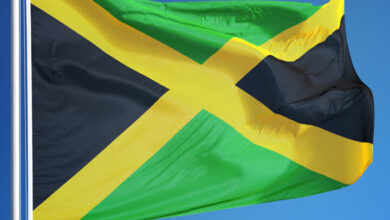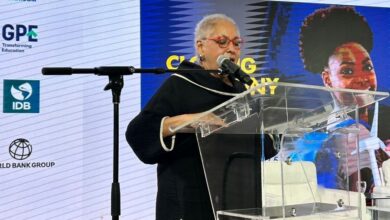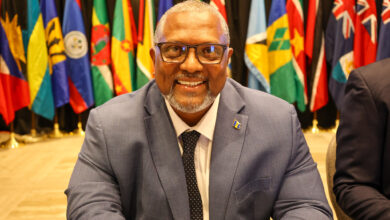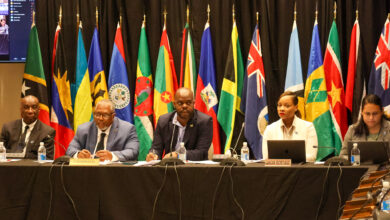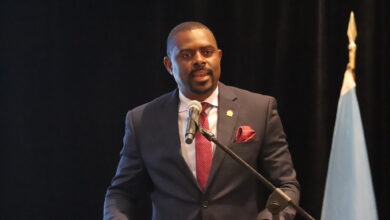The Caribbean Community (CARICOM) and the Southern African Development Community (SADC) took a step towards close r cooperation when high level officials from the two regional groupings met in Kingston, Jamaica on 17-18 April, 2000. The Delegations of both CARICOM and SADC included representatives from their respective Member States.
The SADC Delegation which was led by Dr. Prega Ramsamy, Executive Secretary (ag.) of the Souther African Development Community, included representatives of the SADC Troila (Namibia and Zambabwe) and senior officers of the SADC Secretariat. Mr. Edwin Carrington, Secretary-General of the Caribbean Community, headed the CARICOM delegation, which included representatives from Trinidad and Tobago and Jamaica, the Caribbean Association of Industry and Commerce (CAIC), Air Jamaica and senior officers of the CARICOM Secretariat.
Both sides considered the meeting timely, coming as it did soon after the conclusion of the South Summit in Havana, Cuba which focused on cooperation among developing countries. The Meeting agreed that both Delegations would conduct in-depth reviews of the Declaration and Programme of Action adopted at the Summit and exchange views on their observations.
After sharing information on recent political and economic developments in their respective regions, the two Delegations agreed to establish a framework for closer cooperation and collaboration between the regions on issues being addressed in the international arena. Prime among these were the review, repair and reform of the World Trade Organisation (WTO) and the implementation of the recently concluded ACP-European Union Partnership Agreement. With regard to the former, the Delegations agreed to exchange information deemed necessary to facilitate their effective participation in the ongoing multilateral negotiations.
The SADC Delegation also sought, and was provided with information the Caribbean Community’s approach on its ongoing institutional reform. SADC is also currently involved in an institutional restructuring exercise which is aimed at making the organisation not only more responsive to the needs of Southern Africa, but also better prepared to meet the challenges and exploit the opportunities of a rapidly changing International environment.
In their discussions, the Delegations also explored areas for possible functional cooperation. In this regard, the related area of air transport and tourism were examined with a view to establishing closer operational linkages between Southern Africa and the Caribbean. It was generally felt that there were valuable opportunities for cooperation between the regions’ travel agencies and tour operators. This was all part of the important role which it was generally agreed the private sector must play in establishing and developing such linkages. To this end, the CARICOM and SADC Delegations agreed to take early action to facilitate the contacts between the private sectors of both regions to examine the various possibilities for cooperation and mutual benefit.
A new and significant area for cooperation identified by the Meeting, was that of Disaster Preparedness and Mitigation. At the request of the SADC, which is seeking to develop a regional mechanism for disaster preparedness and mitigation, the CARICOM Delegation outlined the structure and operations of the Caribbean Disaster Emergency Relief Agency (CDERA). The CARICOM Delegation agreed to give urgent consideration to the modalities of support to the SADC effort.
In keeping with an earlier agreement, the Meeting undertook to formalise, as soon as possible, the arrangements for short term staff attachments between the two Secretariats. Priority will be given to attachments in the areas of Gender Development and Internal Oversight.
The Delegations undertook to formalise the arrangements for their cooperation and, in this regard, agreed to consider the modalities for the establishment of a framework for cooperation on the basis of a Memorandum of Understanding.
In light of the rapid development in the international arena, the two sides agreed to maintain regular contact through informal meetings in the margins of international conferences at which they might both be present and provisionally agreed that their next formal encounter should take place in Southern Africa at a venue to be determined between March and May 2001.
The two Delegations expressed their appreciation to the Government of Jamaica for the arrangements made for the meeting and the facilities placed at their disposal.

